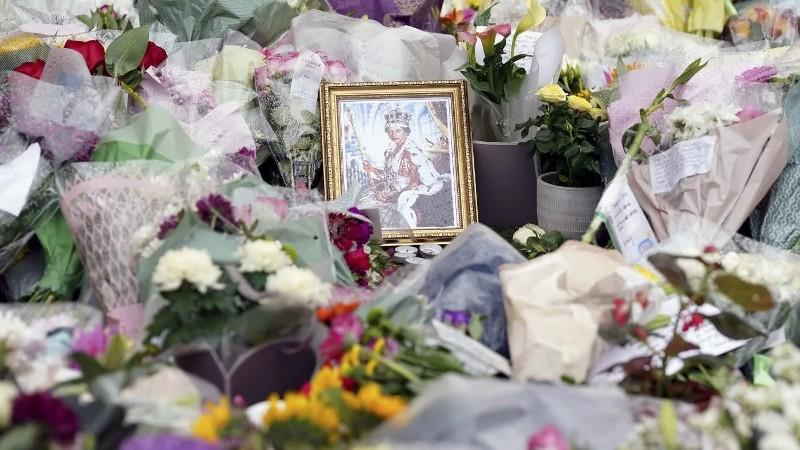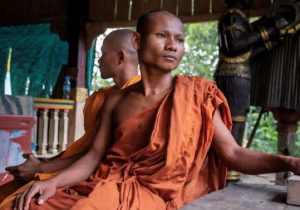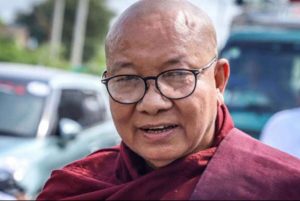If you want to find the meaning, stop chasing after so many things.
Ryokan
On the day of the funeral of Queen Elizabeth II, I drove north for some solitary retreat time on the Scottish west coast. The day had been declared a national holiday and there wasn’t much traffic on the A82 trunk road—people were watching live coverage of the event on their home TVs, I guessed. I listened to the music and prayers from Westminster Abbey on the car radio, not wanting to miss this momentous event shared by many millions of people all over the planet. I am not a monarchist, but found myself intrigued by the rituals surrounding the occasion, drawing in so many people.
I had dipped into the BBC live footage of the continuous stream of people from all walks of life walking past the coffin; the queen lying in state with full regalia in London’s Westminster Hall. It felt like witnessing an art performance, awesome in its mix of medieval pageantry and 21st century multicultural ordinariness. An ex-army man giving the coffin a clipped military salute; a Pakistani woman with a toddler on her arm curtseying; a tall, close-shaved, sensitive-looking young man fighting with his tears, and countless others—each expressing the subtly different ways in which people paid their tributes to the queen, marking the significance of the moment.
People had queued for many hours, and when asked by journalists why they were there, oft-repeated answers were to “be part of history” and “to be part of something bigger.” Something like that also resonated within me as I traversed the series of roundabouts toward Loch Lomond, feeling moved by the mighty organ accompanying the congregation, which was joined by the searing descant of the choir in the next verse of the hymn, augmented by trumpets in the glorifying final bars. Who could resist the power of such orchestration? The music served to intensify and contain a mix of powerful experiences within me, from awe in the face of mortality and the majesty of certain forms of human art and culture, to skepticism and sadness about the dubious ways we make use of our human potential. I felt both a readiness for some ecstatic uplift beyond normal, humdrum practicalities, and some caution about being swept away—manipulated into some irrational mass emotion that may cover up some questionable intent.
It is quite puzzling how much devotion the monarchy inspires in this secular age. Could it be related to a yearning for meaning, integrity, and enchantment within a materialistic culture that holds nothing sacred but monetary growth? Looked at rationally, monarchy doesn’t fit with modern democratic values, but it seems to stand for something that runs deeper than rationality; it taps into some profound longing to be moved by and be part of something vast and beautiful and deserving of reverence. If not the monarchy itself, the queen as a person seems to have inspired respect across a great range of the global population, from blue-collar workers to heads of state. She has been described as dedicated and caring, with an unwavering sense of duty and devoted service. A dignified presence in trying circumstances, with the ability to move with the times. By all accounts, she led a fulfilling and meaningful life, and don’t we all want that?
In my understanding, meaning implies an awareness of personal values and the experience of integrity that arises from seeking alignment of one’s actions with those values—even if it can be a struggle at times. Also important are a sense of accomplishment in various fields of life, such as relationships, work, and creative contribution, as well as a cohesive and adaptable personal narrative about the meaning of life and death.
Me writing this is an attempt at meaning-making. And since one of my values is authenticity, I am wondering where my pronouncements about meaning come from. To what extent are they just reiterations of other people’s beliefs that happen to suit me? What do I really think? What kind of life do I want to lead, meaningfully, in the face of my own certain death? And is there even an “I” that could be relied on to know these things? One of the reasons for going away by myself is to find out, or at least give some space to explore such existential conundrums. The queen’s funeral sets the scene rather fittingly. What do I want people to say about me at my own funeral? Other questions I might ask myself are: “If I had only a day/a month/a year left to live, how would I spend my time? What kind of mental states would I like to experience at the time of death? If I had only so much time left, what would I like to give to the world? And if I were to live again, what mistakes would I avoid?”
I pull into a petrol station as the radio commentator describes how, step by slow, synchronized step, the coffin is lifted from its pedestal by eight royal guards, taken onto their shoulders and turned around toward the entrance of the hall. More organ music, dispersing grief, reassurance, and gravitas. My access to the fuel pump is barred by a red Porsche and I wait for what seems an exceedingly long time for the driver to pay and free up the space. Eventually he appears, balancing a large amount of shopping items on his arms. He precariously fumbles for the key, eventually managing to open the door and stow his purchases. As he sits in front of the wheel, I start my engine, but still no movement. He seems to be checking his smartphone. What would the queen do, I wonder—honk the horn? Or wait patiently, as she must have done during the countless functions she attended. Does it really matter where I spend my time—breathing and being present? What’s the rush?
On arrival at my friend’s cottage in Ardnamurchan, I set up a little shrine facing Loch Sunart. Using what’s there, I place a large fossilized ammonite onto a cloth-draped chair, with two bird nests on either side, evoking, respectively, the vast perspective of deep time and a sense of being held in care and safety. I brought some Buddha images, night lights, incense., and an orange-and-turquoise shawl given to me by a friend who bought it during an Indian pilgrimage. Everything my eyes alight upon conjures meaning—that is, they stand for qualities that are important to me and of which I want to remind myself, not so much intellectually, but viscerally. I tend to spend quite a bit of time at the beginning of a sit in this way, anchoring my intention and core orientation. In my experience, this supports a relaxed, non-striving, and confident attitude throughout the practice.
The Pali word for mindfulness, sati, means “remembering.” Something that is not often emphasized in mindfulness-based stress-reduction courses, where other meanings, such as “being in the moment,” are given more importance. But we need to remind ourselves to be present, otherwise we will just flounder in autopilot, often to our detriment. In meditation, the simple intention and practice of returning to the breath enables us to remember what’s important in our lives: being kind and generous, perhaps, or openminded and lucid. These are the things I would like people to say at my funeral, rather than “she was very good at finding bargains on eBay,” or “she watched many Netflix series.” I would also like them to say that I was relaxed and nonjudgemental, so there is a middle way to be struck.
There are some Dos and Don’ts that have evolved during the many solitary retreats I have been on over the decades: no social contact unless practically necessary; no internet use unless it serves the retreat—I have brought my laptop to listen to some Dharma talks and guided meditations; no alcohol. Among the Dos are at least three daily periods of sitting meditation, mindful movement, walks, some writing and making art, preparing delicious and healthy food. Reading non-Dharma books is an interesting area; I tend to allow myself a bit of that easy way of connecting with something other than just me and my inner ongoings, which can feel a bit intense in an unhelpful way. At the same time, I am aware of the importance of doing nothing and gently sitting through any discomfort that may arise. I have stayed in extremely basic huts before, where much of the time was taken up by fetching water and cutting wood, where a hot-water wash was a time-consuming event, as it was for recluses of the past, for example the 18th century Japanese poet-monk Ryokan. The simplicity of such a lifestyle has much to say for itself, supporting that unselfconscious way of being conscious that our Dharma practice aims for, in a non-aiming sort of way. Here is one of Ryokan’s poems:
My hut lies in the middle of a dense forest;
(John Stevens, trans.)
Every year the green ivy grows longer.
No news of the affairs of men,
Only the occasional song of a woodcutter.
The sun shines and I mend my robe;
When the moon comes out I read Buddhist poems.
I have nothing to report my friends.
If you want to find the meaning,
stop chasing after so many things.
References
Ryokan. Trans. by John Stevens. 1977. One Robe, One Bowl: The Zen Poetry of Ryokan. New York: Weatherhill.
Related features from BDG
The Chakravartin
Silence
What Is a Successful Life?
Japanese Buddhist Poetry: Bearing the Weight of Being
Buddhistdoor View: Enjoyment without Attachment














